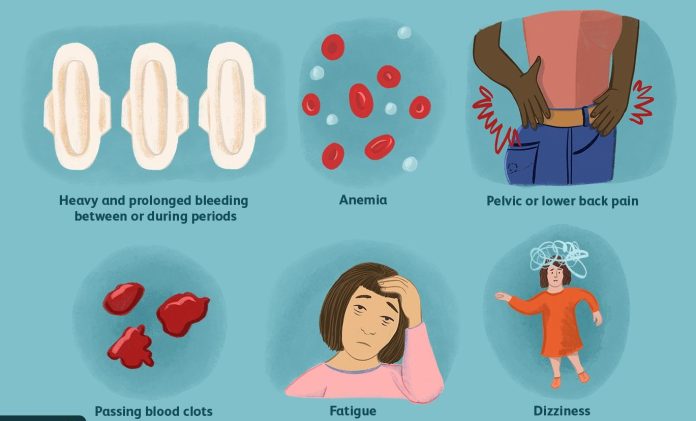Consultant Obstetrics and Gynecologist at Abubakar Tafawa Balewa University Teaching Hospital Bauchi, Dr. Kabir Abdullahi, says the gynaecology unit is currently experiencing a surge in fibroid cases.

“Out of every 10 surgeries we carry out, between six and seven are due to fibroid,” Abdullahi said.
As reported by our correpondent, the gynaecology ward of ATBUTH, Bauchi, was a beehive of activities when she paid a visit to someone who had recently undergone a surgery for the removal of uterine fibroids.
She noted that while her visit lasted, she noted about six other women who were wheeled into the ward and that, upon enquiry from a nurse, she was told that all the six women had also undergone surgery to have uterine fibroids removed.
According to her findings, most of the women complained of heavy menstrual flows and delay in getting pregnant.
Many women are unaware they have fibroids because they do not have any symptoms
Oby & Gyn Abdullahi said that fibroid is a condition mostly found among black women.
Citing localised clinical experience, the physician said, “Fibroid is common among women ages 30- 40 years in Bauchi; and is mostly among women who space their birth and those with fewer number of children.”
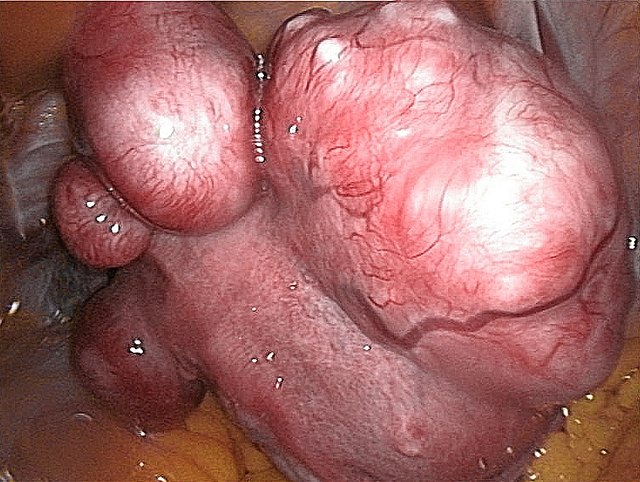
Indeed, a 2016 study conducted among women of childbearing age attending University of Nigeria Teaching Hospital, Ituku-Ozalla, Enugu State between 2009-2013, published by the Nigerian Journal of Health Promotion, states that, “Too long child-spacing should not be encouraged to couples who are lately married because in the process of spacing, uterine fibroid may set in and sometimes leads to the removal of the womb which ends childbirth.”
Again, experts at online portal WebMD suggest that having a baby reduces fibroids, noting that fibroids often shrink after pregnancy.
“In one study, researchers found that, three to six months after delivery, 70% of women who had live births saw their fibroids shrink by more than 50%,” WebMD says.
Fibroids are non-cancerous growths that develop in or around the womb (uterus). The growths are made up of muscle and fibrous tissue, and vary in size. They’re sometimes known as uterine myomas or leiomyomas. Many women are unaware they have fibroids because they do not have any symptoms.
some of the lesser known symptoms of fibroids are weight gain and having a bulging stomach
Causes of fibroids
Abdullahi said that fibroid doesn’t have any known cause. “Risk factors include family history of fibroid, obesity and early onset of puberty. These women come in with heavy menstrual bleeding, prolonged periods and pelvic pain,” he said.
Experts at Mayo Clinic add that genetic changes can also cause fibroids. “Many fibroids contain changes in genes that differ from those in typical uterine muscle cells.
“Hormones — that is estrogen and progesterone, two hormones that stimulate development of the uterine lining during each menstrual cycle in preparation for pregnancy, appear to promote the growth of fibroids,” experts say.
Types of fibroids and locations
According to Mayo Clinic, There are three major types of uterine fibroids: Intramural fibroids grow within the muscular uterine wall. Submucosal fibroids bulge into the uterine cavity; while subserosal fibroids project to the outside of the uterus.
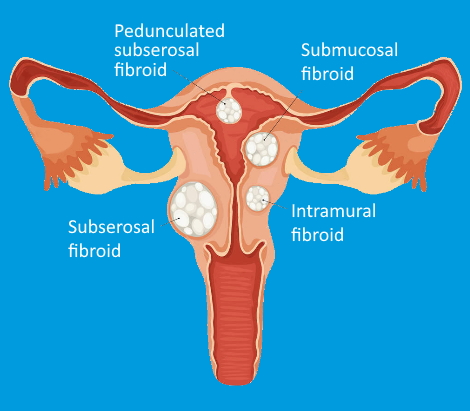
Scientists at the University of California Los Angeles say subserosal fibroids are the most common fibroids. “They can push outside of the uterus into the pelvis.
“Subserosal fibroids can grow large at times and sometimes have a stalk that attaches to the uterus (pedunculated fibroid).
“Intramural fibroids develop in the muscular wall of the uterus,” the UCLA scientists say.
What are the signs of fibroid in a woman?
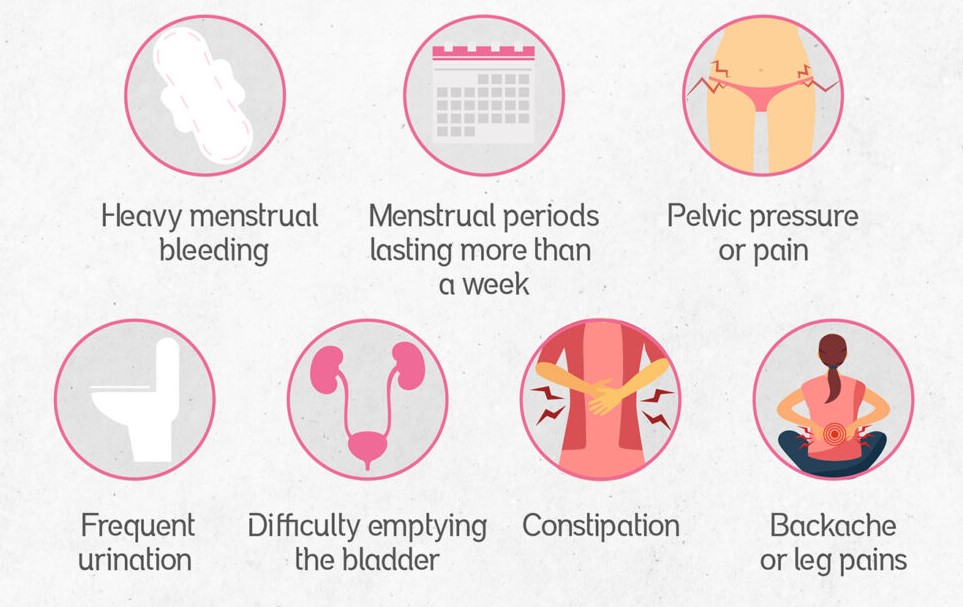
According to physicians at the University of California San Francisco, symptoms of fibroids may include:
- Excessively heavy or prolonged menstrual bleeding
- Pelvic discomfort
- Pelvic pain
- Bladder problems — Such as needing to urinate frequently or inability to urinate despite a full bladder.
- Low back pain — Rarely, fibroids press against the muscles and nerves of the lower back, causing back pain.
- Rectal pressure — Fibroids also can press against the rectum and cause a sensation of rectal fullness, difficulty having a bowel movement or pain with bowel movements. Sometimes, fibroids can lead to the development of a haemorrhoid.
- Discomfort or pain during sexual intercourse.
women who have reached menopause are generally free from the problem of fibroids as their body ceases to produce estrogen
Doctors also say that some of the lesser known symptoms of fibroids are weight gain and having a bulging stomach. “In fact, it is a common symptom. You may think your swollen stomach is just poor eating habits, but fibroids can add weight and volume to your tummy,” experts say.
Dr. Abdullahi added that success rate of the surgeries is high, especially among women who present themselves at an early stage.
“In Bauchi, most of the patients come to the hospital late, they stay away from the hospital with the belief that they are pregnant, as fibroid could grow as big as pregnancy,” Abdullahi said.
He, however, adds that many women are unaware they have fibroids, because they have little or no symptoms.
The consultant said women who have reached menopause are generally free from the problem of fibroids as the body ceases to produce estrogen that feeds it.
What to do?
“We need to intensify awareness among women of reproductive age to always visit the health facility for regular medical checkups,” Abdullahi counsels.
Medical researchers at the University of Chicago, however, say fibroids can go away without surgery. “In patients of all ages, only about 10 percent of fibroids will shrink on their own. The rest will grow larger or stay the same size,” the scientists say.
How can you avoid fibroids?
 Online platform WebMD states that recent study found that eating plenty of fruits like apples and tomatoes, and cruciferous vegetables like broccoli and cabbage, could lower the risk of developing fibroids.
Online platform WebMD states that recent study found that eating plenty of fruits like apples and tomatoes, and cruciferous vegetables like broccoli and cabbage, could lower the risk of developing fibroids.

“Eating healthier choices like organic fruits and vegetables and whole-grain foods could help improve your symptoms,” WebMD says.
Also, according to online platform Healthline, there are a number of changes you can make that might help reduce your risk for fibroids. They include:
- Follow a Mediterranean diet, which includes lots of healthy foods like whole grains, fruits, vegetables, seafood, beans, and nuts.
- Add plenty of fresh and cooked green vegetables, fresh fruit, legumes, and fish to your plate.
- Cut back on alcohol
- Lower your blood pressure
- Get enough vitamin D
- Stop smoking.
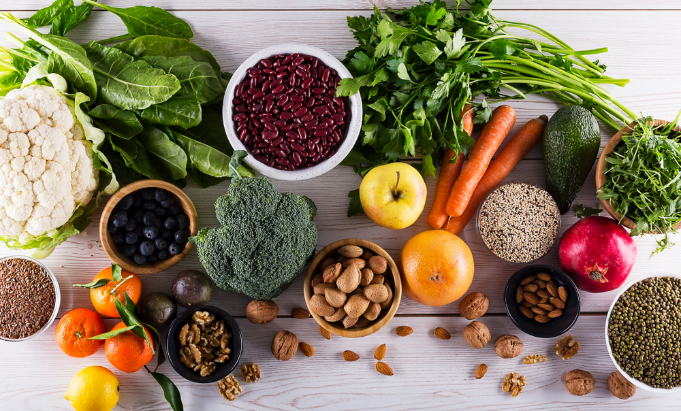 Also, experts at Cleveland Clinics counsel that all fruits and vegetables have major health benefits, but apples, brococoli, cabbage, citrus fruits like oranges, lemons and grapefruit, as well as fresh toamtoes seem to be particularly helpful in fighting fibroids.
Also, experts at Cleveland Clinics counsel that all fruits and vegetables have major health benefits, but apples, brococoli, cabbage, citrus fruits like oranges, lemons and grapefruit, as well as fresh toamtoes seem to be particularly helpful in fighting fibroids.

